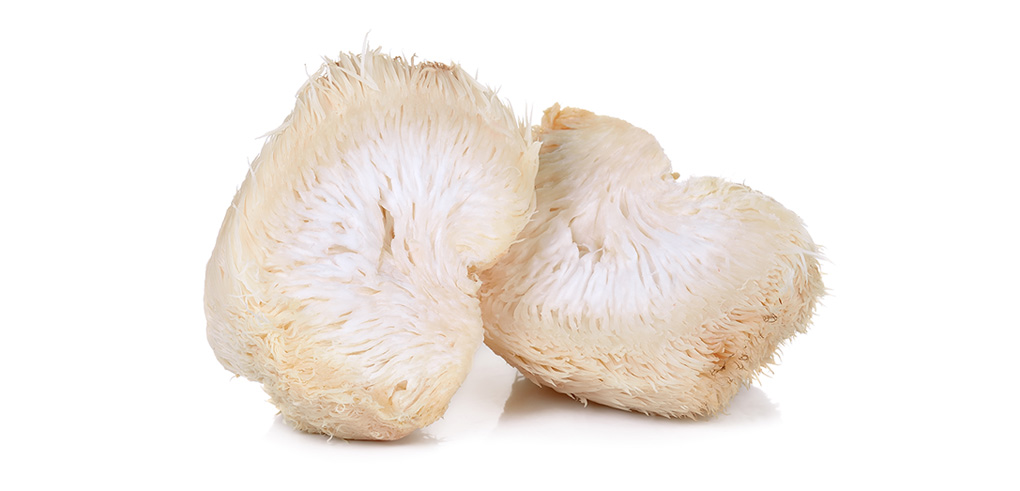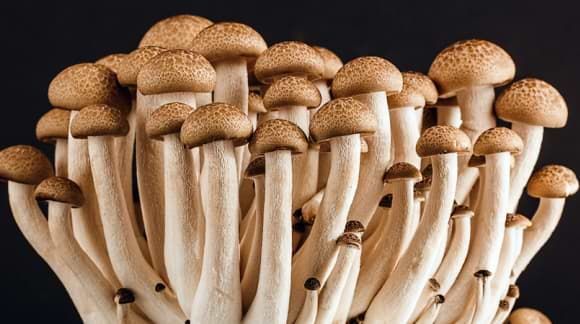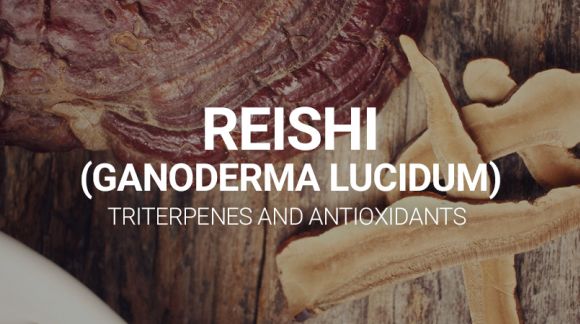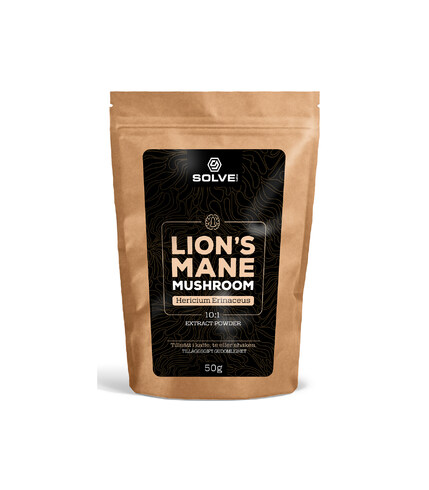Lion's Mane Mushroom - influence on brain and nervous system

The Lion's Mane (Hericium erinaceus) also known as Yamabushitake, is a mushroom occuring in deciduous forests, very rare in Poland, but in many European countries it is considered an endangered and dying out species. It belongs to the group of nootropics, i.e. substances that have a beneficial effect on cognitive functions and brain function. This group is widely used in medicine in the form of drugs, as well as supplements or stimulants.
Like most mushrooms, Lion's Mane also has a fairly wide spectrum of activity. Not only does it have traits attributed to nootropics, but also other additional ones, which makes this mushroom extremely interesting.
Nootropic - improvement of cognitive functions
Cognitive functions are closely related to the following processes: perception, attention, memory, thinking. Speaking in simple language, it can be defined as the ability to perceive stimuli, react to them and absorb them, and even more colloquially it is "contacting, embracing oneself and what is happening around". For the purposes of research, the concept of "cognitive decline" was created, which can be translated as "cognitive collapse". It is show by a deterioration of the above-mentioned functions, generally a feeling of mental slowdown, which may be caused by diseases, deficiencies, old age or even stress. In studies on the elderly, it was found that the Lion’s Mane mushroom reduced the effects of cognitive decline, i.e. cognitive impairment.
In studies on mice with neurodegenerative diseases, an improvement in these functions was found, and in subsequent trials it turned out that the beneficial effect was also obtained in healthy individuals. The results show that the lion's mane can significantly contribute to the improvement of the condition of people in neurodegenerative diseases, as well as improve cognitive functions in healthy people.
Acetylcholine versus Alzheimer
Alzheimer's is the most common neurodegenerative disease, it is the most common form of dementia, it is associated with serious symptoms (memory impairment, confusion, mood swings, speech problems, loss of vital functions). One of the hypotheses on which drugs are currently created is that Alzheimer's is caused by insufficient synthesis of acetylcholine (a neurotransmitter). In studies on mice, it was found that the lion's mane improved the functioning of the cholinergic system (which produces neurotransmitters) and increased the concentration of acetylcholine.
On this basis, it can be concluded that the substances contained in the mice increase the amount of acetylcholine in mice, and thus reduce the symptoms of Alzeheimer's disease. Thus, it can be assumed that it has a similar effect on humans and other mammals.
Regeneration and growth of nerve fibers
One of the studies in 2015 tested the ability of the Lion's Mane to increase the growth activity of neurites (these are nerve fibers that are part of neurons), and the results were analyzed using the immunofluorescence method. It turned out that the mushroom extract caused an increase in neurites in the examined organs by 20.47%, 22.47% and 21.70% (in the brain, spinal cord and retinal cells). These are high numbers that indicate that the lion's mane can improve the growth and regeneration of nerves, which in turn helps to improve the functioning of the nervous system and the brain.
Influence on immunity, anti-cancer activity
The polysaccharides contained in the mycosis affect the immune system. It was found that they strengthen cellular and humoral immunity, increase the activity of macrophages and NK cells ("natural killer" - cells that are, inter alia, the body's response to cancer and other threats). Moreover, it was found that they positively influence the intestinal immune response by activating cell signaling pathways.
Anxiety, concentration, irritability
A study published in 2010 in one of the international scientific journals focused on checking the influence of the lion's mane served in cookies on these three parameters. An important feature of the study was the reference to the group that received a placebo. They found that the group who consumed Lion's Mane saw a decrease in anxiety and irritability, and improved sleep quality.
These are important parameters in relation to cognitive function and overall "good mental function".
Depression
In the study on mice, the tested subjects were given an extract from mice, and the substance on which it was focused was amycenone. In tests, basing on which, effect on depression could have been determined, it was shown that Lion's Mane could reduce symptoms, and this was the conclusion of this study.
Lion's Mane is a mushroom that has been studied both on humans and on animals (mainly mice). Analyzing the results of these studies, it can be concluded that it affects many functions of the body and has the strongest effect on the nervous system and the brain. Its possible beneficial effects on cognitive functions, concentration and memory seem to be a very useful thing in today's times that require fast brain activity. It may be especially useful for the elderly and people exposed to neurodegenerative diseases.

Bibliography:
Mori K, Inatomi S, Ouchi K, Azumi Y, Tuchida T. Phytother. Improving effects of the mushroom Yamabushitake (Hericium erinaceus) on mild cognitive impairment: a double-blind placebo-controlled clinical trial. Res. 2009 Mar;23(3):367-72. doi: 10.1002/ptr.2634.
Valentina Cesaroni, Andrej Gregori, Margherita Repetti, Chiara Romano, Germano Orrù, Laura Botta, Carolina Girometta, Maria Lidia Guglielminetti, Elena Savino, Paola Rossi. Dietary Supplementation of Hericium erinaceus Increases Mossy Fiber-CA3 Hippocampal Neurotransmission and Recognition Memory in Wild-Type Mice Federico Brandalise, 6 , Evid Based Complement Alternat Med. 2017; 2017: 3864340.
The Neuroprotective Properties of Hericium erinaceus in Glutamate-Damaged Differentiated PC12 Cells and an Alzheimer’s Disease Mouse Model Int J Mol Sci. 2016 Nov; 17(11): 1810.
Dietary Supplementation of Hericium erinaceus Increases Mossy Fiber-CA3 Hippocampal Neurotransmission and Recognition Memory in Wild-Type Mice Evid Based Complement Alternat Med. 2017; 2017: 3864340.
Yao W1, Zhang JC1, Dong C1, Zhuang C2, Hirota S3, Inanaga K4, Hashimoto K5. Effects of amycenone on serum levels of tumor necrosis factor-α, interleukin-10, and depression-like behavior in mice after lipopolysaccharide administration. Pharmacol Biochem Behav. 2015 Sep;136:7-12. doi: 10.1016/j.pbb.2015.06.012. Epub 2015 Jul 4.
Samberkar S1, Gandhi S2, Naidu M1, Wong KH1, Raman J2, Sabaratnam V2. Lion's Mane, Hericium erinaceus and Tiger Milk, Lignosus rhinocerotis (Higher Basidiomycetes) Medicinal Mushrooms Stimulate Neurite Outgrowth in Dissociated Cells of Brain, Spinal Cord, and Retina: An In Vitro Study.
Nagano M1, Shimizu K, Kondo R, Hayashi C, Sato D, Kitagawa K, Ohnuki K. Reduction of depression and anxiety by 4 weeks Hericium erinaceus intake. Send to Biomed Res. 2010 Aug;31(4):231-7.
Sheng X1, Yan J1, Meng Y1, Kang Y1, Han Z1, Tai G1, Zhou Y1, Cheng H1. Immunomodulatory effects of Hericium erinaceus derived polysaccharides are mediated by intestinal immunology. Food Funct. 2017 Mar 22;8(3):1020-1027. doi: 10.1039/c7fo00071e.







